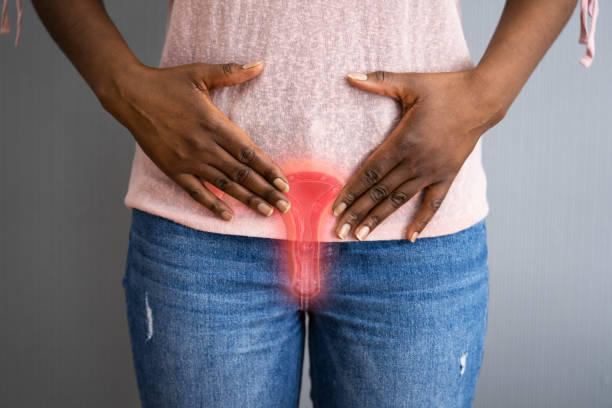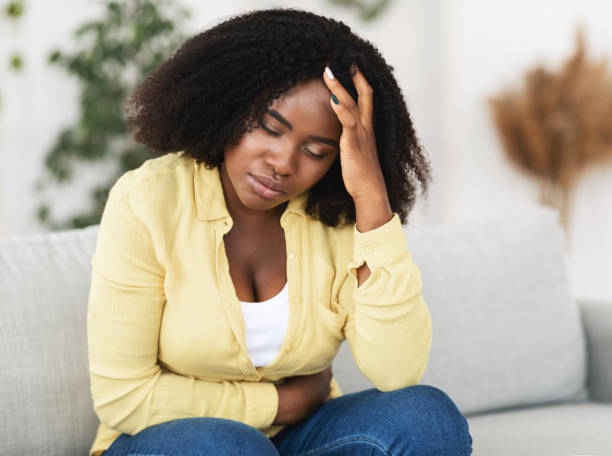Endometriosis: Understanding the Signs and Impacts

Ganiyat Adeniji for Black Girl Vitamins
Endometriosis, or endo, is a complex and often misunderstood gynecological condition that affects millions of women worldwide. It occurs when tissue similar to the lining of the uterus grows outside of the uterus, leading to a variety of symptoms and potential complications. Recognizing the signs of endometriosis early is crucial for timely diagnosis and management. However for Black women suffering with endometriosis, 50% are less likely to get a diagnosis of endometriosis and even 40% are misdiagnosed with Pelvic Inflammatary Disease.
What Is Endometriosis?
Endometriosis is a women’s health condition that’s diagnosed when tissue that resembles the uterine lining, or endometrium, develops where it doesn’t belong. It may occur on the fallopian tubes, ovaries, or within the pelvic cavity. Similar to the uterine lining during the menstrual cycle, it also thickens, breaks down, and bleeds.
Unfortunately, because the tissue isn’t in the right place in your body, it can’t escape. The buildup can lead to inflammation, the development of scar tissue called adhesions, and cysts (endometriomas).
Endo is largely considered to be a condition that impacts women of reproductive age. This is because it responds to the release of estrogen and progesterone, female sex hormones associated with menstruation. While rare, endometriosis after menopause does occur in up to 4% of patients.
While the effects are clear, doctors still don’t understand the exact cause of endometriosis. One popular theory is retrograde menstruation, which means menstrual blood flows backward through the fallopian tubes and into the pelvic cavity. Other theories relate to immune system disorders and genetic factors.
Why Is Getting Diagnosed With Endometriosis So Hard for Black Women?
Getting an endometriosis diagnosis isn’t easy as a Black woman. Many doctors inaccurately assume we aren’t likely to get endo.
You need an experienced OB/GYN who recognizes your symptoms and finds abnormalities during a pelvic exam. Then, they’ll generally need to confirm it with a minor surgery, called a laparoscopy, during which you’ll be under general anesthesia.
Do I Have the Symptoms of Endometriosis?
Here are five common signs that may indicate you have endometriosis.
Severe Menstrual Pain:
One of the hallmark symptoms of endometriosis is severe menstrual cramps that are much worse than usual. These cramps may start before your period begins and can persist throughout the menstrual cycle. The pain may be debilitating, making it difficult to carry out everyday activities. This is often one of the earliest signs of endometriosis and should not be ignored.
Chronic Pelvic Pain:
Women with endometriosis often experience chronic pelvic pain that is not related to their menstrual cycle. This pain may be felt in the lower abdomen, lower back, or pelvic region. It can be sharp, stabbing, or dull and may worsen during intercourse or bowel movements. Persistent pelvic pain that interferes with daily quality of life is a red flag for endometriosis.
Heavy Menstrual Bleeding:
Another common symptom of endometriosis is heavy menstrual bleeding, also known as menorrhagia. Women with endometriosis may notice that their periods are significantly heavier than normal, requiring frequent changes of sanitary products. This excessive bleeding can lead to anemia and fatigue if left untreated.
Gastrointestinal Issues:
Endometriosis can affect the digestive system, leading to symptoms such as bloating, diarrhea, constipation, and nauseaSome women may also experience painful bowel movements or blood in their stool. These gastrointestinal symptoms are often overlooked but can be indicative of endometriosis, especially when accompanied by other pelvic pain.
Infertility:
Endometriosis is a leading cause of infertility in women. The condition can impact fertility in several ways, including the formation of ovarian cysts, inflammation of reproductive organs, and scarring of the fallopian tubes. If you have been trying to conceive without success and experience symptoms of endometriosis, it is essential to seek medical evaluation and treatment.
How does this affect your hormones?

Endometriosis is known to disrupt hormonal balance in the body, particularly estrogen levels. This hormonal imbalance can contribute to the growth and spread of endometrial tissue outside the uterus, exacerbating symptoms and complications. Additionally, the presence of endometriosis can impair fertility by affecting egg quality, ovulation, and implantation of the embryo.
What Are the Treatment Options for Endometriosis?
Many different endometriosis treatment options can help you reclaim your life. Hormone therapy is a common approach to help regulate your menstrual periods and reduce estrogen production, which can slow the growth of endometrial tissue. This may be offered through a gonadotropin-releasing hormone (GnRH), birth control pills, or progestin-only options.
If your condition has become a severe case, your doctor may recommend a minimally invasive laparoscopic surgery. This allows your gynecologist to locate and cut out the endometrial lesions in your pelvic cavity. This procedure can reduce your severe pain and improve your fertility for at least a year or two.
In extreme cases, your doctor may recommend the removal of your ovaries and a hysterectomy for more long-lasting but not permanent pain relief. This will kickstart menopause, which may be treated with hormone replacement therapy.
Support Is Available for Black Women With Endometriosis
Exploring avenues to support individuals dealing with the challenges of endometriosis is vital. The Black Girl Vitamins #periodtt Bundle emerges as a thoughtful resource tailored to bring comfort and relief during such times. This curated selection, comprising essentials like Iron, B12, D3 for energy, comforting teas, cozy socks for warmth, and sweet treats of Authentic Decadent Askanya Haitian Chocolate, embodies a care-filled approach toward menstrual wellness. Such initiatives not only aim to address physical discomfort but also foster a sense of self-care and understanding for women affected by conditions like endometriosis.
Endometriosis requires early detection and comprehensive management. By recognizing the signs and symptoms of endometriosis, women can seek timely medical intervention to alleviate pain, preserve fertility, and improve their quality of life. If you suspect you may have endometriosis based on the symptoms discussed in this essay, do not hesitate to consult with a healthcare provider for a proper diagnosis and treatment plan. Your health and well-being deserve attention and care.
Take the Path to Better Living With Endometriosis
If you experience symptoms such as painful periods, difficulty getting pregnant, or heavy bleeding, it’s important to consult a healthcare provider. Getting early medical intervention can ease your symptoms, preserve your fertility, and improve your overall well-being.
Your treatment options can range from nonsteroidal anti-inflammatory drugs (NSAIDs) for pain management to surgical interventions. Your gynecologist will tailor the best option for you to your symptoms, preferences, and reproductive goals.
Sources:
Endometriosis And Menopause – Management Strategies Based on Clinical Scenarios | Wiley
How Endo His Black Women Harder | HealthCentral
Behind the Times: Revising Endometriosis and Race | American Journal of Obstetrics and Gynecology
Endometriosis: Learn More – Diagnosing Endometriosis | National Library of Medicine











